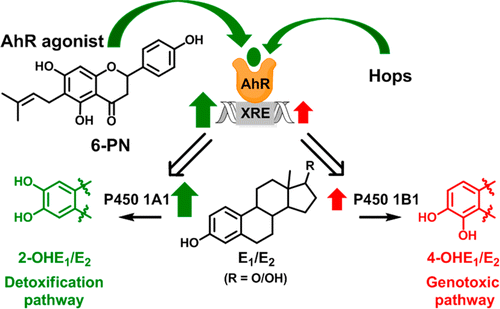Hops could help reduce breast cancer risk

Hops, the flower cones used in beer-making, are also found in dietary supplements designed to help treat post-menopausal symptoms and other conditions. Scientists are now investigating whether an extract from the plant could also help fend off breast cancer. In the ACS journal Chemical Research in Toxicology, one team reports new lab tests on breast cells that support this possibility.
In the U.S., breast cancer is one of the most commonly diagnosed cancers in women. Exposure to estrogen has long been considered one of the risk factors associated with developing the disease, particularly in post-menopausal women. Women who are undergoing menopause often use hormone replacement therapy, or HRT, to alleviate symptoms such as hot flashes. But HRT has been linked to an increased risk of breast cancer and heart disease, so some women are turning to hops supplements, which contain phytoestrogens, as a natural alternative. However, their effect on cancer risk is unclear. Preliminary lab studies have suggested that certain active compounds from hops could have protective properties. Building on this lead, Judy L. Bolton and colleagues used an enriched hop extract to test its effects on estrogen metabolism, one of the processes in the development of breast cancer.
The researchers applied the extract to two different breast cell lines to see how they would affect estrogen metabolism. One particular hops compound called 6-prenylnaringenin, or 6-PN, boosted the cells' detoxification pathway that studies have associated with a lower risk for breast cancer. Thus the results suggest that 6-PN could have anti-cancer effects, although more studies would be needed to further investigate this possibility, the researchers say.
More information: Shuai Wang et al. Hop () extract and 6-prenylnaringenin induce P450 1A1 catalyzed estrogen 2-hydroxylation, Chemical Research in Toxicology (2016). DOI: 10.1021/acs.chemrestox.6b00112
Abstract
Humulus lupulus L. (hops) is a popular botanical dietary supplement used by women as a sleep aid and for postmenopausal symptom relief. In addition to its efficacy for menopausal symptoms, hops can also modulate the chemical estrogen carcinogenesis pathway and potentially protect women from breast cancer. In the present study, an enriched hop extract and the key bioactive compounds [6-prenylnarigenin (6-PN), 8-prenylnarigenin (8-PN), isoxanthohumol (IX), and xanthohumol (XH)] were tested for their effects on estrogen metabolism in breast cells (MCF-10A and MCF-7). The methoxyestrones (2-/4-MeOE1) were analyzed as biomarkers for the nontoxic P450 1A1 catalyzed 2-hydroxylation and the genotoxic P450 1B1 catalyzed 4-hydroxylation pathways, respectively. The results indicated that the hop extract and 6-PN preferentially induced the 2-hydroxylation pathway in both cell lines. 8-PN only showed slight up-regulation of metabolism in MCF-7 cells, whereas IX and XH did not have significant effects in either cell line. To further explore the influence of hops and its bioactive marker compounds on P450 1A1/1B1, mRNA expression and ethoxyresorufin O-dealkylase (EROD) activity were measured. The results correlated with the metabolism data and showed that hop extract and 6-PN preferentially enhanced P450 1A1 mRNA expression and increased P450 1A1/1B1 activity. The aryl hydrocarbon receptor (AhR) activation by the isolated compounds was tested using xenobiotic response element (XRE) luciferase construct transfected cells. 6-PN was found to be an AhR agonist that significantly induced XRE activation and inhibited 2,3,7,8-tetrachlorodibenzo-p-dioxin (TCDD) induced XRE activity. 6-PN mediated induction of EROD activity was also inhibited by the AhR antagonist CH223191. These data show that the hop extract and 6-PN preferentially enhance the nontoxic estrogen 2-hydroxylation pathway through AhR mediated up-regulation of P450 1A1, which further emphasizes the importance of standardization of botanical extracts to multiple chemical markers for both safety and desired bioactivity.














